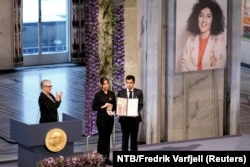Jailed Iranian rights activist and Nobel Peace laureate Narges Mohammadi has been notified that she will stand trial Tuesday in connection with her recent activities within prison, such as disseminating her statements and writings to the public, according to a social media post.
This will be her first trial since the awarding of this year’s Nobel Peace Prize to her, according to her Instagram page. She has previously been tried and convicted by Iranian authorities on other charges.
According to the page, managed by her close associates, Mohammadi received a notice stating that her trial is scheduled to be held at Branch 26 of the Revolutionary Court, under the jurisdiction of Judge Iman Afshari.
Mohammadi has been serving multiple sentences in Tehran's notorious Evin prison on charges that include spreading "anti-government propaganda."
In her previous legal proceedings, Mohammadi abstained from attending court sessions, asserting her non-recognition of the Revolutionary Court.
The Nobel Peace Prize was formally presented in Oslo, Norway. With Mohammadi incarcerated, the honor was received by her twin 17-year-old children, who served as representatives for the Iranian human rights activist. The twins live in exile in Paris with their father.
In the ceremony, broadcast live by VOA Persian, Ali and Kiana Rahmani conveyed a message from their mother to the audience, expressing solidarity with the brave women and men of Iran. In her message, she underscored the "religious tyranny” of the Islamic Republic and labeled its government as "anti-women.” She also stressed the importance of bolstering civil society in Iran and appealed for international support.
Despite numerous domestic and international appeals for her release following the Nobel Prize award, Narges Mohammadi remains incarcerated.
A few hours before the Nobel Peace Prize ceremony, Mohammadi, who is currently denied visitation and phone calls in prison, declared her intention to initiate a hunger strike "on Human Rights Day.” The protest is aimed at condemning the severe and pervasive human rights violations in Iran.
Mohammadi became the second Iranian woman to receive the Nobel Peace Prize. The first recipient of the prestigious award was Shirin Ebadi, a human rights lawyer and jurist, who was honored two decades ago in 2003.
Mohammadi began her activism in the 1990s as a young physics student and was first arrested in 2011 for her work with incarcerated activists and their families.
Her subsequent activism, bringing attention to Iran’s death penalty, torture and sexual violence against political prisoners, especially women, resulted in more arrests.
Last year, as a leader among prisoners, she voiced support for the demonstrators who took to the streets of Iran to protest the death of 22-year-old Mahsa Amini in police custody. Prison officials stopped Mohammadi from receiving calls and visitors, but she managed to have an article she had written smuggled out of the country and published in The New York Times on September 16, exactly one year after Amini died.
Some information for this report comes from the Associated Press.





